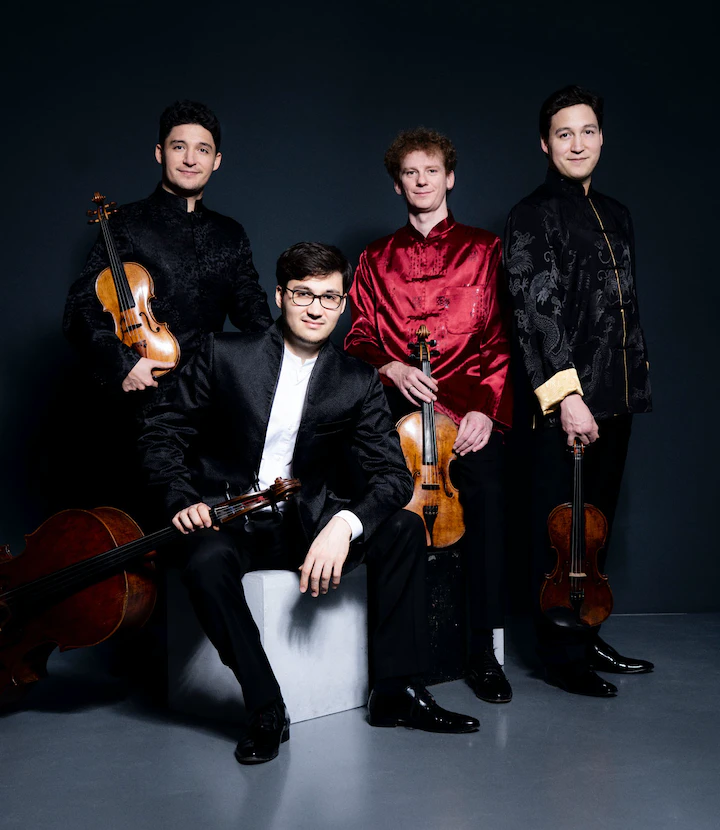Gifted Schumann Quartet brings Viennese program to Logan Center

Hearing “Schumann Quartet,” one naturally thinks of the three works penned by Robert during a manic creative spree in the summer of 1842. But the Schumann Quartet is another story. Formed in 2007, the decorated German ensemble comprises brothers Erik, Ken, and Mark Schumann—violins and cello, respectively, and no relation to Robert—and violist Veit Hertsenstein.
University of Chicago Presents hosted the Schumann gentlemen Friday night at the Logan Center as a stop on the foursome’s current US tour, which will culminate in a residency with the Chamber Music Society of Lincoln Center. They brought both elegance and flair to a substantial program of Viennese warhorses.
The Schumann musicians opened with Mozart’s Quartet in A Major, K. 464, one of the six “Haydn” Quartets, which were dedicated to the composer and which, in turn, astounded him. The quartet naturally followed the blossoming of the opening Allegro’s unassuming material, affectingly emphasizing its ubiquitous deceptive cadences. The Menuetto went with Classical poise, the Schumann members helping its closing bars evaporate into thin air.
The brothers and Hertsenstein brought a probing sensibility to the evolving variations of the Andante, with cellist Mark capturing the buoyancy of its “Drum” ostinato to perfection. The closing Allegro ma non troppo moves from innocent beginnings to complex high drama, which the four players captured in spirited fashion, before concluding with another pitch-perfect diminuendo to nothing.
Alban Berg’s String Quartet, Op. 3, from 1910 followed, the Schumann musicians making the stylistic pivot with ease. They put across the nervy, ardent feel of the Langsam, where the impassioned yet muted lines seemed like a musical analogue to Freud’s contemporaneous theories of repressed impulses. They also achieved the feat of sustaining a continuous narrative line in this knotty, gestural music. The concluding second movement, Mässige Viertel, has whiffs of a Viennese waltz, and is at some moments reflective, at others unhinged. The four organically navigated this schizoid vacillation to its guttural, emphatic conclusion.
The second half was devoted to Beethoven’s String Quartet in E-flat Major. Op. 127 often feels more like a study in tension and motion than in melody, and this came across in the Schumann’s reading Friday night. They brought regal resonance to the opening Maestoso gesture, repeated at each of its returns, and deftly plumbed the Allegro’s complexities. The Adagio had a reverential unfolding, with natural lyricism and a genuine sense of spiritual stasis near the end.
The extended Scherzo vivace, which begins with four winking pizzicato chords that are never repeated, had a fittingly angular energy, with precipitous momentum in the headlong tarantella episodes. The final movement begins with unassuming motives that are elaborated in a seemingly experimental fashion. The four men brought collective vigor to the martial second theme, and turned on a dime for the metric modulation to the 6/8 coda, ending the night with gusto and receiving eager, well-deserved applause.
University of Chicago Presents hosts cellist Natalie Clein with pianist Qing Jiang at 7:30 p.m. on February 23 in Mandel Hall. The pair will perform music of Bloch, Weinberg, Elias, and Mendelssohn. https://chicagopresents.uchicago.edu/
Posted in Performances


